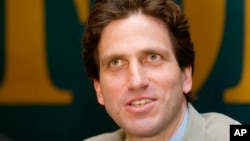U.S. Secretary of State John Kerry says that 10 years after the unsolved murder of an American journalist in Moscow, investigative journalism in Russia remains "under attack" and the "space for independent voices in Russian media is rapidly shrinking."
Paul Klebnikov was working as chief editor of Forbes magazine's Russian edition when he was shot outside his Moscow office on July 9, 2004. He was severely wounded and died a short time later in the hospital.
Secretary of State Kerry released a statement Tuesday to "honor the memory of Paul Klebnikov and the other journalists in Russia who have lost their lives."
He called on the Russian government to protect journalists and "respect fundamental freedoms of expression."
He also again called on Russia to bring those who murdered Klebnikov to justice. No one has been convicted for ordering or carrying out the killing.
The New York-based Committee to Protect Journalists says 36 journalists have been murdered in Russia since 1992.
In 2006, Russian prosecutors accused Kozh-Akhmed Nukhaev, a Chechen separatist politician and alleged organized crime boss, of masterminding Klebnikov's murder, and Nukhaev was subsequently placed on the Interpol international wanted list.
Klebnikov had talked extensively with Nukhaev and published a Russian-language book about him titled "Conversations with a Barbarian."
Three Chechen men were arrested and put on trial for the Klebnikov murder but were acquitted. One was later convicted and jailed for an unrelated crime. The acquittals of the other two men were overturned, but a retrial was halted in late 2007 after one of them failed to show up in court.
Earlier, Klebnikov had written a Forbes cover story about Boris Berezovsky, accusing the then leading Russian oligarch and Kremlin insider of a string of high-level shady deals.
Berezovsky sued Forbes for libel in a British court and won a partial retraction in 2003.
Klebnikov expanded the article into a book titled "Godfather of the Kremlin: Boris Berezovsky and the Looting of Russia." It also focused on Berezovsky, but looked more broadly at high-level corruption during the era of Russian President Boris Yeltsin.
Berezovsky died in exile in London in 2013. A post-mortem examination found he died by hanging, but that there was no evidence of a violent struggle.
Some information for this report comes from AP and Reuters.





